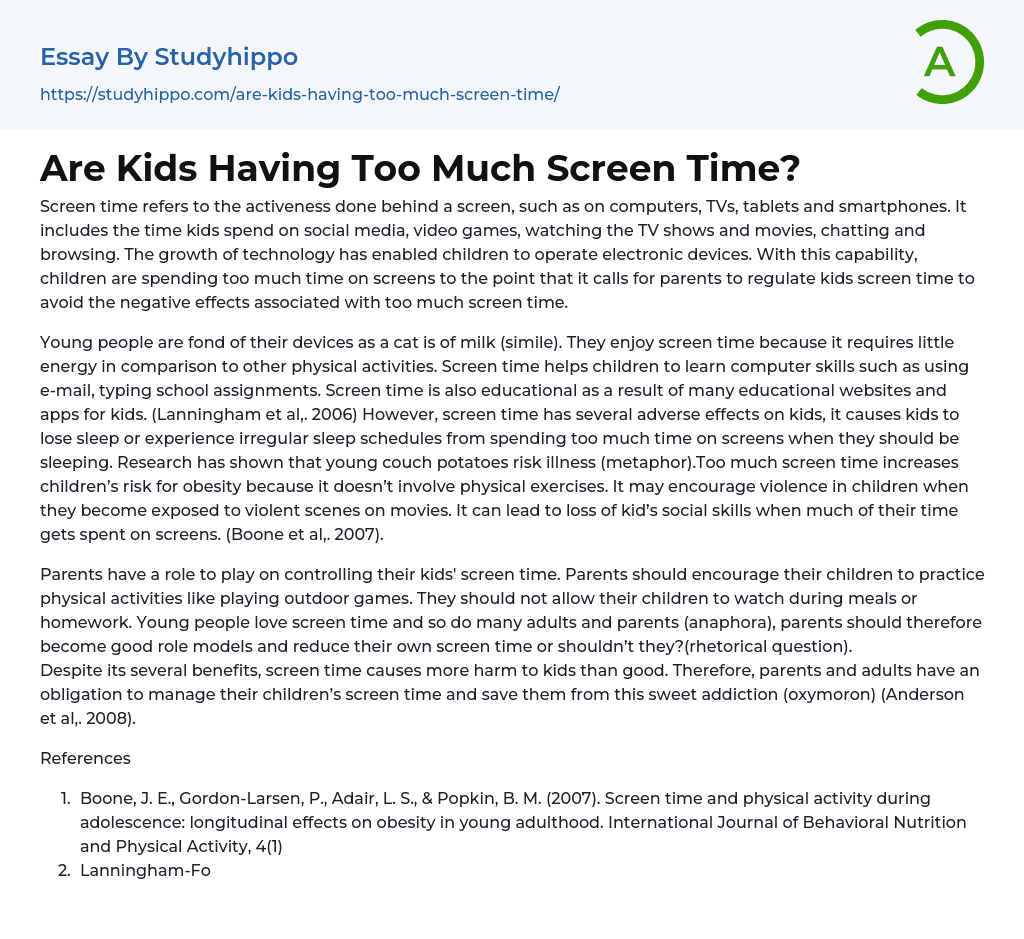Screen time, encompassing activities conducted on computers, TVs, tablets, and smartphones, pertains to the involvement with a screen. This encompasses diverse actions such as utilizing social media, engaging in video games, viewing TV shows and movies, conversing, and browsing. The progressions in technology have facilitated children's interaction with electronic devices. Consequently, adolescents are devoting excessive amounts of time to screens, necessitating parental intervention to tackle the adverse consequences of prolonged screen time. Analogous to a cat's affinity for milk (simile), young individuals possess a profound attachment towards their gadgets.
Children find screen time enjoyable because it requires less energy compared to other physical activities. Additionally, screen time allows them to develop computer skills like email usage and typing school assignments. Moreover, it is considered educational due to the availability of numerous educational websites and apps d
...esigned for children (Lanningham et al.,).
Despite being in 2006, children are still facing various negative effects due to excessive screen time, including sleep deprivation or disrupted sleep patterns caused by using screens excessively before bedtime. Studies have indicated that sedentary behavior among young individuals, commonly known as "young couch potatoes," poses health risks. Excessive screen time leads to a lack of physical activity and increases the chances of obesity in children. Moreover, exposure to violent movie scenes on screens can contribute to the development of violent tendencies in children. Additionally, spending excessive time with screens can impede the development of social skills as a significant portion of their time is devoted to interacting with screens (Boone et al., 2007).
Parents have the responsibility of controlling and regulating their children's electronic device usage, while also encouraging outdoor activities. They should establish rules to
forbid screen use during meals or homework. It is crucial to acknowledge that both young individuals and adults, including parents, spend a considerable amount of time in front of screens. Consequently, it becomes vital for parents to set a good example by reducing their own screen time too. Do you agree?
Despite the negative impact of screen time on children, it has numerous benefits. Therefore, parents and adults should monitor their children's screen time and protect them from developing addictive behavior (oxymoron) (Anderson et al,. 2008).
References
- Boone, J. E., Gordon-Larsen, P., Adair, L. S., ; Popkin, B. M. (2007). Screen time and physical activity during adolescence: longitudinal effects on obesity in young adulthood. International Journal of Behavioral Nutrition and Physical Activity, 4(1)
- Lanningham-Foster, L., Jensen, T. B., Foster, R.
C., Redmond, A. B., Walker, B. A., Heinz, D., Levine, J. A. (2006).
Energy expenditure of sedentary screen time compared with active screen time for children. Pediatrics, 118(6), e1831-e1835.
BMC Public Health, volume 8, issue 1, page 1.
- Child essays
- Child labor essays
- Childcare essays
- Anorexia essays
- Breakfast essays
- Caffeine essays
- Chewing gum essays
- Child Development essays
- Chocolate essays
- Diet essays
- Dieting essays
- Eating essays
- Eating Habits essays
- Energy Drink essays
- Food essays
- Genetically Modified Food essays
- Genetically Modified Organisms essays
- Junk Food essays
- Metabolism essays
- Milk essays
- vegetarian essays
- Vitamin essays
- Weight Loss essays




